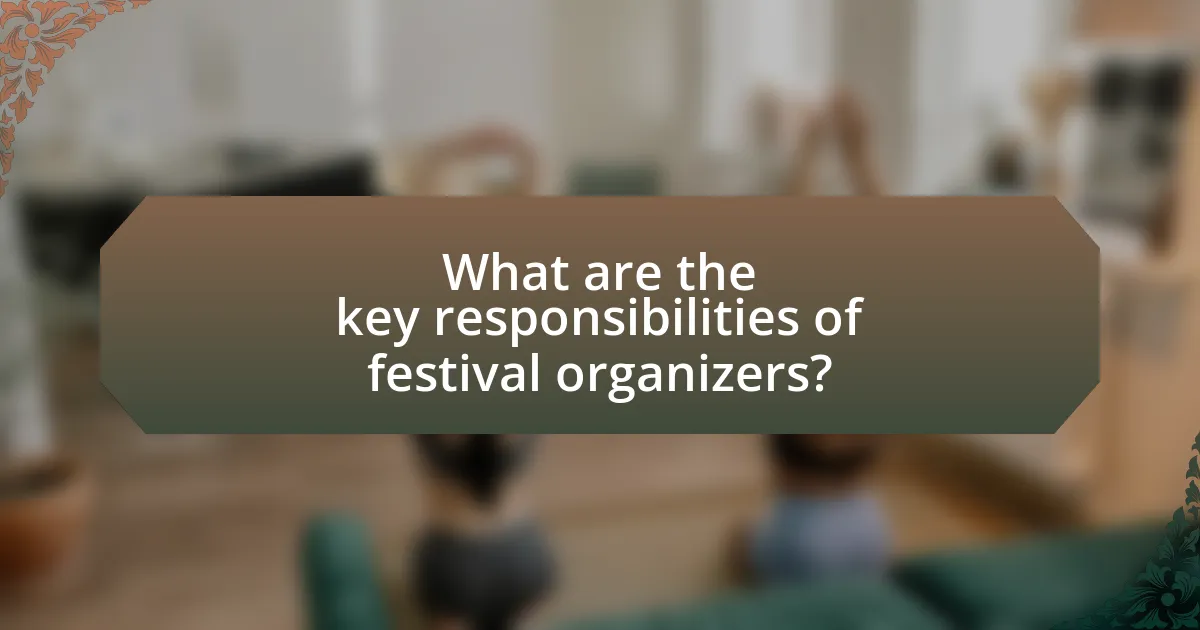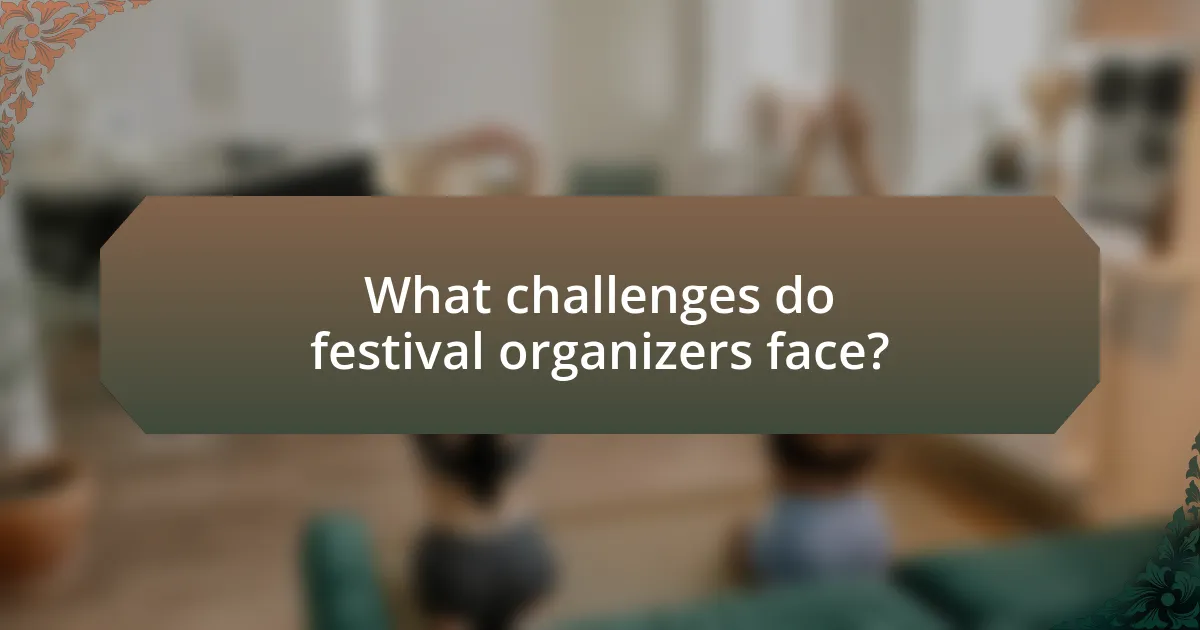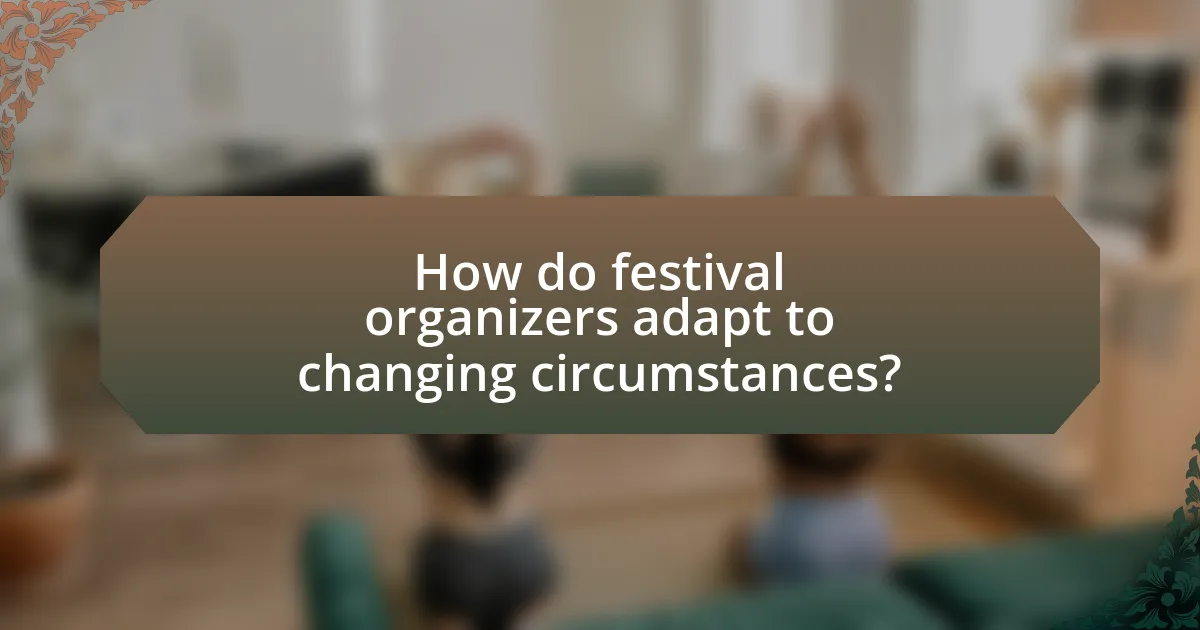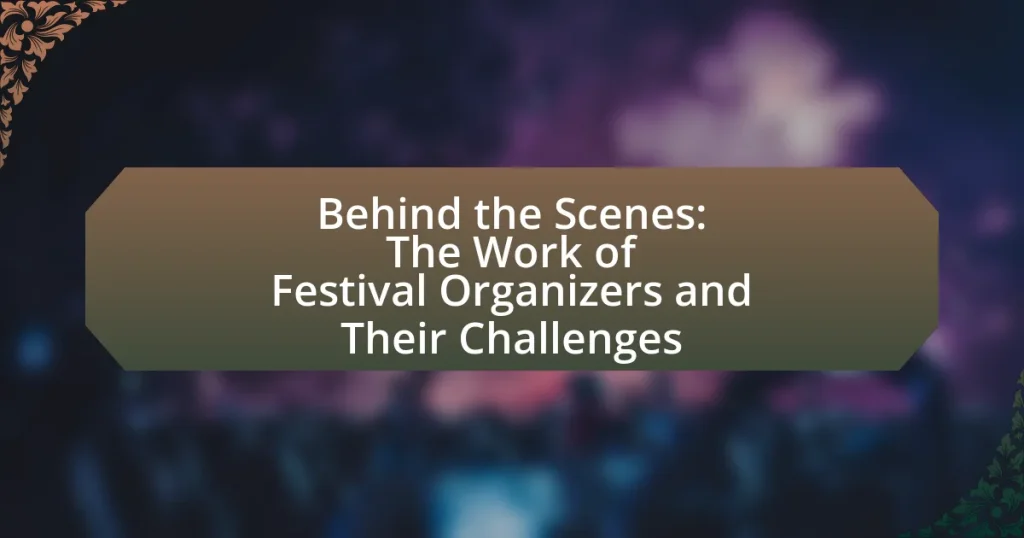Festival organizers play a crucial role in the planning, coordination, and execution of events, encompassing responsibilities such as securing permits, managing budgets, and overseeing logistics. The article delves into the structured processes involved in event planning, including venue selection, marketing strategies, and team roles, highlighting the importance of effective communication and adaptability in overcoming challenges. It also addresses the impact of budget constraints, logistical issues, and the necessity of safety measures, while emphasizing the role of technology and social media in modern festival organization. Key takeaways for successful festival management include thorough planning, collaboration, and the ability to adapt to changing circumstances.

What are the key responsibilities of festival organizers?
Festival organizers are responsible for planning, coordinating, and executing all aspects of a festival. This includes securing permits, managing budgets, coordinating logistics such as venue selection and vendor contracts, and overseeing marketing and promotion efforts. Additionally, they are tasked with ensuring compliance with safety regulations and managing staff and volunteers during the event. The effectiveness of festival organizers can be seen in the successful execution of large-scale events, such as the Coachella Valley Music and Arts Festival, which requires meticulous planning and coordination to accommodate thousands of attendees and numerous performances.
How do festival organizers plan and execute events?
Festival organizers plan and execute events by following a structured process that includes defining the event’s vision, securing funding, selecting a venue, coordinating logistics, and marketing the event. Initially, organizers establish the event’s goals and target audience, which guides all subsequent decisions. They then create a budget, often supported by sponsorships or ticket sales, to ensure financial viability.
Selecting an appropriate venue involves assessing capacity, accessibility, and facilities, which are crucial for attendee experience. Organizers coordinate logistics such as permits, vendor contracts, staffing, and safety measures, ensuring compliance with local regulations. Marketing strategies, including social media campaigns and partnerships, are implemented to attract attendees and generate buzz.
This systematic approach is validated by industry standards, such as the Event Management Body of Knowledge (EMBOK), which outlines best practices for successful event planning and execution.
What steps are involved in the initial planning phase?
The initial planning phase involves several key steps: defining the festival’s objectives, establishing a budget, selecting a date and venue, assembling a planning team, and creating a timeline. Defining the festival’s objectives sets the direction and purpose, while establishing a budget ensures financial feasibility. Selecting a date and venue is crucial for logistics and availability, and assembling a planning team brings together diverse skills necessary for execution. Finally, creating a timeline helps in organizing tasks and deadlines effectively. These steps are foundational for successful festival organization, as they provide a structured approach to managing resources and expectations.
How do organizers select the right venue for a festival?
Organizers select the right venue for a festival by evaluating factors such as location, capacity, accessibility, and amenities. The venue’s location is crucial as it affects attendance; a site that is easily reachable by public transport and has ample parking is preferred. Capacity must align with expected attendance to ensure comfort and safety, while accessibility for individuals with disabilities is also a key consideration. Additionally, organizers assess available amenities, including restrooms, food vendors, and stages, to ensure they meet the festival’s needs. Historical data shows that festivals held in well-chosen venues experience higher attendance and participant satisfaction, reinforcing the importance of this selection process.
What roles do different team members play in festival organization?
In festival organization, different team members play specific roles that are crucial for the event’s success. The event manager oversees the entire planning and execution process, ensuring that all aspects align with the festival’s vision and objectives. The logistics coordinator handles the operational details, such as venue setup, transportation, and equipment rental, which are essential for smooth operations. The marketing team is responsible for promoting the festival, utilizing social media, advertising, and public relations to attract attendees. Volunteers assist in various capacities, providing support in areas like crowd management and information dissemination. Each role contributes to the overall effectiveness of the festival, demonstrating the importance of collaboration among team members to achieve a successful event.
What are the specific duties of a festival director?
A festival director is responsible for overseeing all aspects of a festival’s planning and execution. This includes coordinating logistics, managing budgets, securing permits, and liaising with vendors and sponsors. The festival director also curates the program, selects performers or speakers, and ensures compliance with safety regulations. Additionally, they lead a team of staff and volunteers, handle marketing and public relations, and evaluate the festival’s success post-event. These duties are essential for creating a successful and engaging festival experience for attendees.
How do volunteers contribute to the success of a festival?
Volunteers significantly contribute to the success of a festival by providing essential manpower and support in various operational areas. Their roles often include assisting with setup and teardown, managing ticket sales, guiding attendees, and ensuring the smooth execution of events. For instance, a study by the National Endowment for the Arts found that festivals with a strong volunteer base reported higher attendee satisfaction and operational efficiency. This demonstrates that volunteers not only enhance the festival experience for attendees but also help organizers manage logistics effectively, ultimately leading to a more successful event.

What challenges do festival organizers face?
Festival organizers face numerous challenges, including logistical coordination, budget management, and securing permits. Logistical coordination involves managing multiple vendors, artists, and staff, which can lead to complications if not effectively organized. Budget management is critical, as organizers must balance expenses with revenue from ticket sales and sponsorships, often facing unexpected costs that can jeopardize the festival’s financial viability. Additionally, securing permits from local authorities can be a lengthy and complex process, with regulations varying by location, which can delay planning and execution. These challenges are compounded by the need to ensure safety and compliance with health regulations, especially in light of recent global health concerns.
How do budget constraints impact festival planning?
Budget constraints significantly limit the scope and scale of festival planning. When organizers face financial limitations, they must prioritize essential elements such as venue selection, artist bookings, and marketing strategies, often resulting in reduced quality or quantity of performances and amenities. For instance, a study by the Event Management Journal indicates that festivals operating on tighter budgets frequently compromise on talent quality, leading to lower attendee satisfaction and potentially reduced ticket sales. Additionally, budget constraints can force organizers to seek sponsorships or partnerships, which may influence programming decisions and overall festival direction.
What strategies can organizers use to manage limited budgets?
Organizers can manage limited budgets by prioritizing essential expenses and seeking in-kind sponsorships. By identifying critical elements that directly contribute to the event’s success, such as venue costs and key performers, organizers can allocate funds more effectively. Additionally, in-kind sponsorships, where businesses provide goods or services instead of cash, can significantly reduce costs. For instance, a study by the Event Marketing Institute found that 78% of event organizers reported that partnerships with local businesses helped them stay within budget. This approach not only alleviates financial pressure but also fosters community engagement and support.
How do unexpected expenses affect festival execution?
Unexpected expenses significantly disrupt festival execution by straining budgets and reallocating resources. When organizers encounter unforeseen costs, such as last-minute vendor fees or equipment failures, they must divert funds from other planned activities, which can lead to reduced quality or cancellation of certain festival elements. For instance, a study by the Event Management Journal found that 70% of festival organizers reported that unexpected costs directly impacted their ability to deliver the planned experience, resulting in lower attendee satisfaction and potential revenue loss. This financial strain can also lead to increased stress among organizers, affecting overall event management and execution.
What logistical issues must organizers address?
Organizers must address transportation, venue management, resource allocation, and communication as key logistical issues. Transportation involves ensuring efficient movement of attendees, staff, and equipment, which is critical for maintaining schedules and accessibility. Venue management includes securing appropriate locations, managing layout, and ensuring compliance with safety regulations. Resource allocation focuses on distributing supplies, staffing, and equipment effectively to meet the demands of the event. Communication is essential for coordinating between teams, vendors, and participants to ensure smooth operations. Each of these logistical aspects directly impacts the overall success of the event, as evidenced by studies showing that effective logistics can enhance attendee satisfaction and operational efficiency.
How do organizers ensure safety and security at festivals?
Organizers ensure safety and security at festivals by implementing comprehensive planning and coordination strategies. They conduct risk assessments to identify potential hazards and develop emergency response plans tailored to the specific event. Additionally, organizers collaborate with local law enforcement and emergency services to establish security protocols, including crowd management and surveillance systems. For instance, the use of trained security personnel and medical staff on-site is standard practice, ensuring rapid response to incidents. Furthermore, organizers often utilize technology such as metal detectors and surveillance cameras to enhance safety measures. These strategies are supported by industry standards and guidelines, such as those provided by the Event Safety Alliance, which emphasize the importance of proactive safety management in large gatherings.
What are the challenges of coordinating with vendors and suppliers?
Coordinating with vendors and suppliers presents several challenges, including communication breakdowns, logistical issues, and differing expectations. Communication breakdowns can lead to misunderstandings regarding timelines, deliverables, and specifications, which can disrupt the overall planning process. Logistical issues, such as transportation delays or inventory shortages, can hinder the timely delivery of goods and services essential for event execution. Additionally, differing expectations between festival organizers and vendors regarding quality, pricing, and service levels can create conflicts that complicate coordination efforts. These challenges are critical to address, as they directly impact the success of festival operations and the overall attendee experience.

How do festival organizers adapt to changing circumstances?
Festival organizers adapt to changing circumstances by implementing flexible planning strategies and utilizing real-time data to make informed decisions. For instance, during the COVID-19 pandemic, many organizers shifted to hybrid models, combining in-person and virtual experiences to accommodate health guidelines while maintaining audience engagement. This adaptability is supported by the use of technology, such as ticketing platforms that allow for quick adjustments in capacity and scheduling, ensuring compliance with local regulations. Additionally, organizers often conduct surveys and gather feedback to understand audience preferences, enabling them to pivot their offerings effectively in response to evolving situations.
What role does technology play in modern festival organization?
Technology plays a crucial role in modern festival organization by streamlining operations, enhancing attendee experiences, and facilitating communication. For instance, event management software allows organizers to efficiently manage ticket sales, vendor coordination, and scheduling, which can significantly reduce administrative burdens. Additionally, mobile apps provide real-time information to attendees, such as schedules, maps, and notifications, improving overall engagement. According to a report by Eventbrite, 80% of festival-goers prefer using mobile apps for event information, highlighting the importance of technology in meeting audience expectations. Furthermore, social media platforms enable organizers to promote events, engage with audiences, and gather feedback, which is essential for continuous improvement. Overall, technology not only optimizes logistical aspects but also enhances the overall festival experience for both organizers and attendees.
How can organizers utilize social media for promotion?
Organizers can utilize social media for promotion by creating engaging content that highlights event features, shares behind-the-scenes insights, and interacts with potential attendees. This approach fosters community engagement and builds anticipation, as evidenced by a 2021 study from Eventbrite, which found that 80% of event organizers reported increased ticket sales through effective social media marketing. By leveraging platforms like Instagram and Facebook, organizers can reach wider audiences, utilize targeted ads, and encourage user-generated content, further enhancing visibility and engagement.
What tools are available for managing ticket sales and attendance?
Tools available for managing ticket sales and attendance include platforms like Eventbrite, Ticketmaster, and Brown Paper Tickets. These platforms facilitate online ticket sales, track attendance, and provide analytics on sales performance. For instance, Eventbrite allows organizers to create custom event pages and manage ticket types, while Ticketmaster offers extensive distribution channels and marketing tools. Additionally, these tools often integrate with other software, such as CRM systems, to streamline the overall event management process.
What best practices can help festival organizers succeed?
Effective planning and communication are best practices that can help festival organizers succeed. Organizers should establish a detailed timeline that outlines all tasks, deadlines, and responsibilities, ensuring that every team member is aware of their roles. Additionally, maintaining open lines of communication among staff, vendors, and stakeholders fosters collaboration and addresses issues promptly. Research indicates that festivals with clear communication strategies experience fewer operational challenges and higher attendee satisfaction rates. For instance, a study by the Event Management Institute found that 75% of successful events attributed their success to effective team communication and planning.
How can effective communication improve team collaboration?
Effective communication enhances team collaboration by ensuring that all members are aligned on goals, tasks, and expectations. When team members share information clearly and consistently, it reduces misunderstandings and fosters a collaborative environment. Research indicates that teams with strong communication practices are 25% more productive, as they can quickly address issues and adapt to changes. This alignment not only streamlines workflows but also builds trust among team members, which is crucial for successful collaboration in complex projects like festival organization.
What are the key takeaways for overcoming common festival challenges?
Key takeaways for overcoming common festival challenges include thorough planning, effective communication, and adaptability. Thorough planning involves creating detailed timelines and checklists to ensure all aspects of the festival are addressed, which can reduce last-minute issues. Effective communication among team members and stakeholders fosters collaboration and quick problem-solving, as evidenced by successful festivals that prioritize regular updates and meetings. Adaptability is crucial, as unforeseen circumstances can arise; festivals that have contingency plans in place, such as alternative venues or backup suppliers, are better equipped to handle disruptions. These strategies collectively enhance the overall festival experience and mitigate potential challenges.
